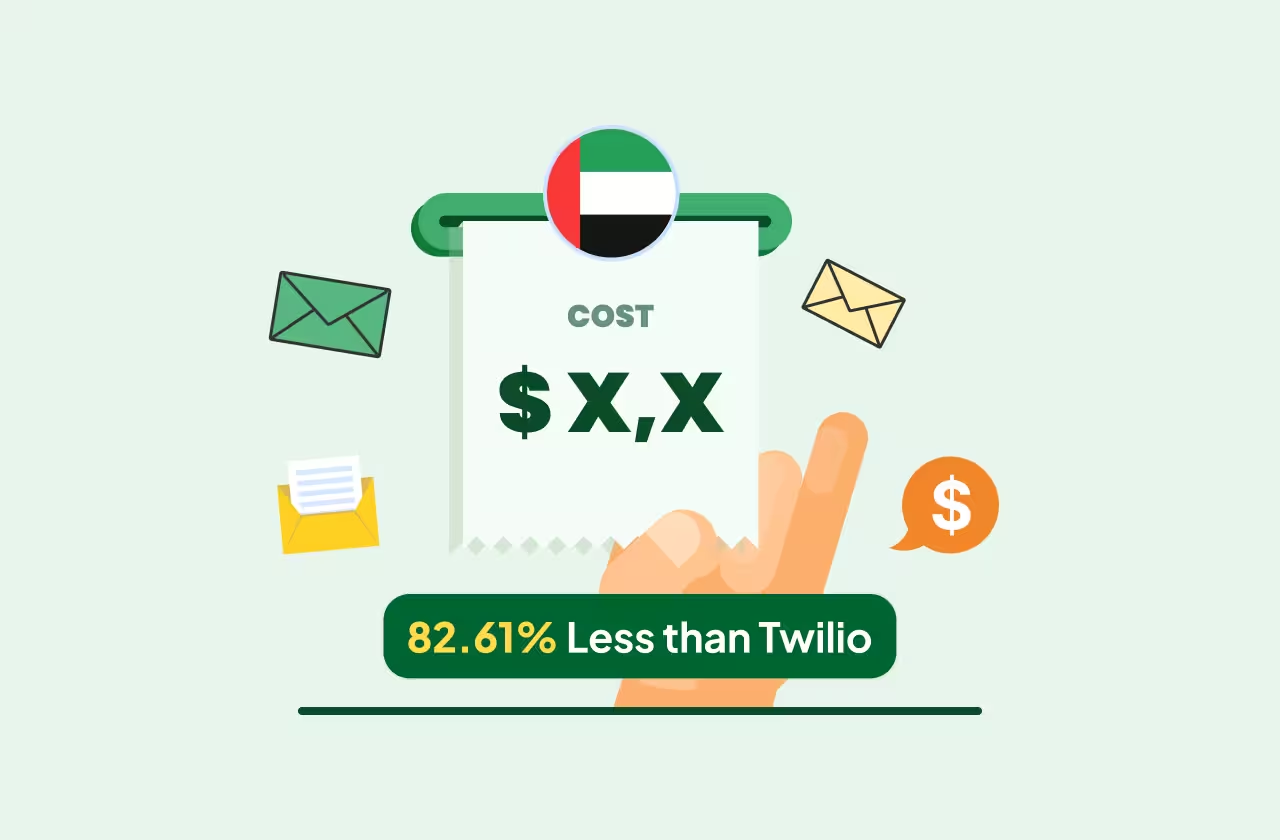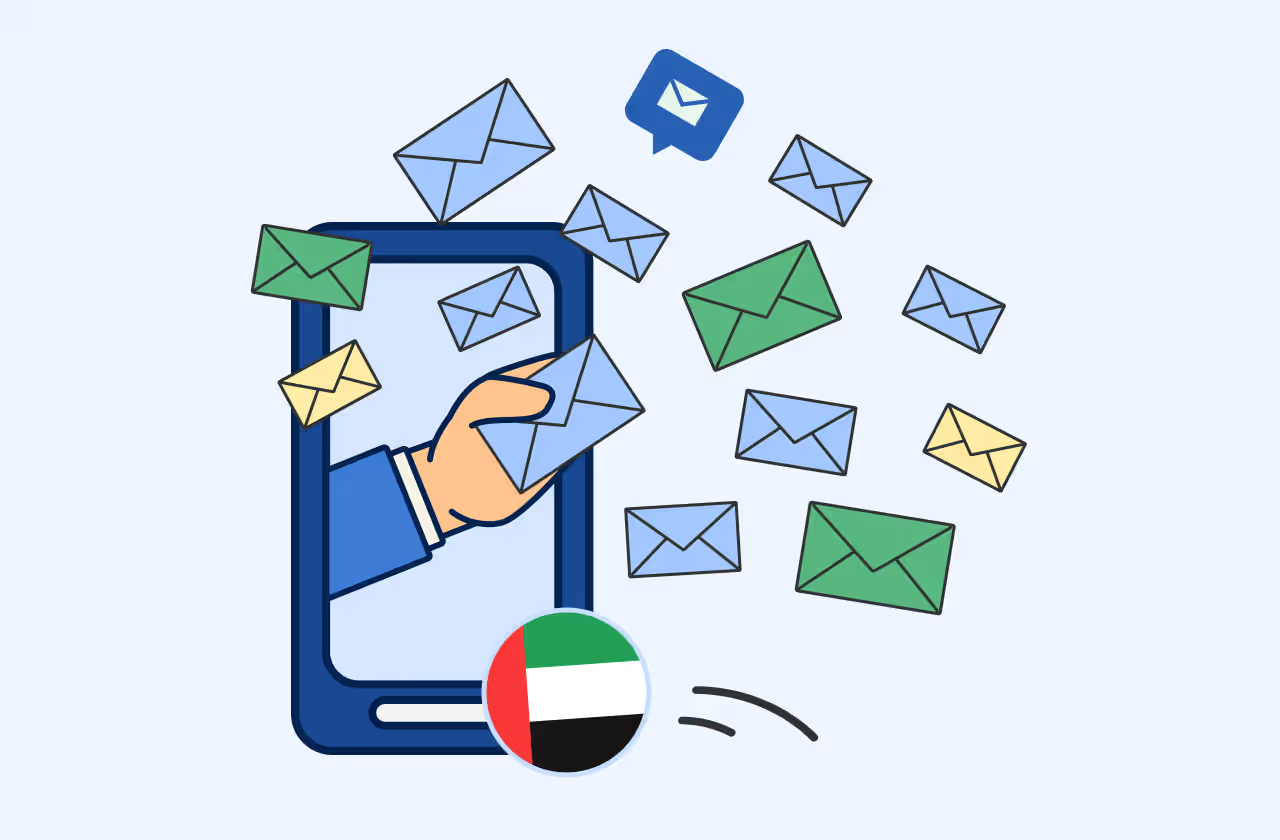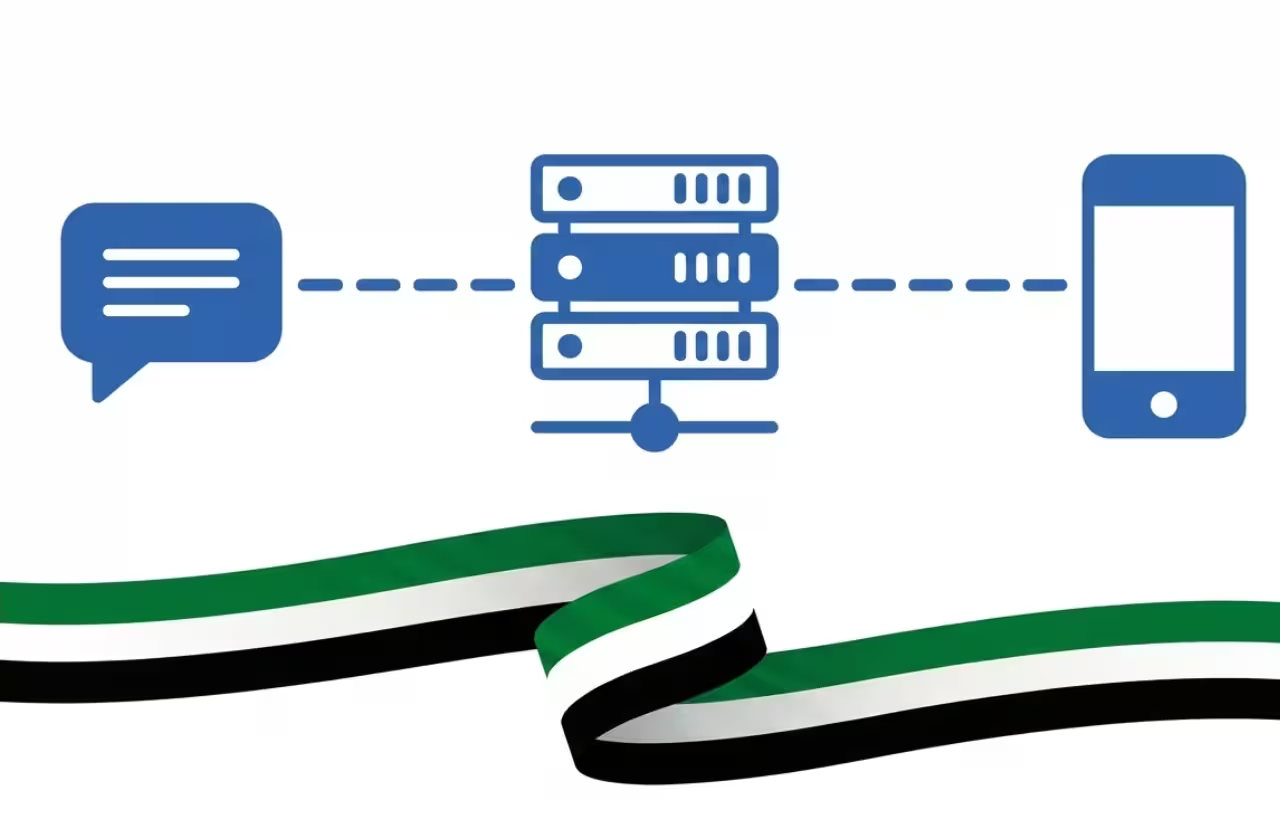Key Takeways
- In hyper competitiveness, SMS campaigns offer user insights and engagement at lightning speed
- Unlike social media marketing, SMS campaigns rely on direct, opt-in communication with customers who have given explicit consent to receive a business's messages
- Key strategies for a successful SMS campaign include sending welcome messages, product updates, feedback requests etc.
- There are multiple benefits of SMS campaigns including high engagemet rate, personalization, integration with other channels etc.
- SMS campaigns can be implemented using an SMS API provider and personalization, timing, frequency are some of the best practices of SMS campaigns
In this hyper competitive marketing industry, SMS campaigns emerge as direct lines to your customers, offering insights and engagement at lightning speed.
With a staggering 98% open rate, SMS marketing campaigns are not just about delivering messages—they're about forging lasting connections and sparking actions in real time via SMS campaigns. There are multiple channels including WhatsApp marketing campaigns that marketeers rely upon. SMS continues to maintain its relevance amidst other emerging channels.
In this article, we'll explore the practical steps to craft the best SMS campaigns that resonate with customers, dive into regulatory guidelines for compliant communication, and navigate the challenges to unlock the full potential of your SMS marketing strategy.
Understanding SMS Campaigns
Understanding the dynamics of SMS campaigns is crucial for leveraging its potential in your marketing strategy.
Unlike social marketing, which relies on public content for user interaction, SMS campaigns hinge on direct, opt-in communication with customers who have given explicit consent to receive your messages. This personal touch can manifest in various forms, from personalized promotions to time-sensitive offers.
In 2020, the global mobile business messaging sphere saw a 10% surge, with SMS dominating 98% of this traffic, highlighting its unparalleled reach. According to Mobilesquared, A2P messaging has also found an effective use case in OTP SMS.
The retail sector, in particular, sent a staggering 408 billion messages, showcasing SMS's pivotal role in consumer engagement. The reason behind this? SMS messages boast high engagement rates, often being opened within mere minutes of receipt, making them an ideal conduit for delivering news, coupons, and other promotions to consumers who prefer text communications.
Key strategies for a successful SMS campaign

- Welcome Messages: Greet new subscribers and set the tone for future communications.
- Product Updates: Announce new arrivals or back-in-stock alerts to keep customers informed.
- Shopping Cart Reminders: Nudge customers about abandoned carts to boost sales.
- Feedback Requests: Engage with customers post-purchase to gather valuable insights.
- Event Promotions: Drive awareness and attendance for online or in-person events.
- VIP Programs: Offer exclusive deals to foster loyalty and repeat business.
With SMS marketing's support in over 220 countries, your messages are assured to reach your audience, even in the most remote locations. Such a wide coverage and reach is where SMS finds its edge vis a vis other business communication channels.
Benefits of SMS Campaigns
1. High Engagement Rates:
With a 97% read rate within the first 15 minutes of delivery, SMS campaigns ensure your message is not only delivered but also read almost instantly. This level of immediacy is unparalleled, especially when compared to the average email open rate.
2. Cost-Effective with Strong ROI:
SMS campaigns aren't just about high engagement; they're also economically viable. Approximately 45% of SMS campaigns yield a successful return on investment, marking them as a cost-efficient choice for businesses of all sizes.
3. Customer Lifecycle Engagement:
From the first touchpoint to fostering long-term loyalty, SMS marketing engages customers throughout their entire lifecycle. Its targeted nature means you're reaching out to those who are most likely to engage with and purchase from your brand.
4.Speedy Campaign Creation and Delivery:
When time is of the essence, SMS marketing campaigns can be swiftly created and disseminated, allowing your business to react in real-time to events or competitor moves.
5. Personalization at Its Best:
Personalized SMS messages, which can include a customer's name, past buying behavior, demographics, or even location, are not just messages; they are powerful tools for connection, as detailed by emotive.io.
6. Integration with Other Channels:
When SMS marketing is integrated with other channels like social media and email, the impact is magnified, creating a cohesive and comprehensive marketing strategy. You can enable the same using an SMS API provider.
7. Efficient Feedback Collection:
Gathering customer feedback is a breeze with SMS. A significant 31% of consumers are likely to respond to a survey via SMS, making it a valuable channel for gauging customer satisfaction and gathering insights.
How to Implement SMS Campaigns
In order to set triggers and implement SMS campaigns at scale, you can use an SMS API provider like Message Now by Message Central. You can get in touch with the team to get access and get started. The platform provides: -
- Best SMS routes
- Competitive SMS rates
- 24/7 support
- Reliable and fast SMS delivery
- Analytics and reports
In countries like India, you can implement use cases like SMS verification without getting into the complication of DLT registration.
Key Strategies for Successful SMS Campaigns
1. Crafting the Message:
Keep it simple and straightforward. Your SMS should be under 160 characters, clear, and to the point. Steer clear of abbreviations, emoticons, and all caps to maintain professionalism. Reserve open-ended messages for when you truly want to spark a conversation.
2. Calls-to-Action (CTAs):
Embed powerful CTAs within your messages. Phrases like "Show this text," "Click here," "Text-to-Win," "Text-to-Vote," and "Buy now" can significantly increase customer engagement and drive action.
3. Timing is Everything:
Send your SMS at opportune times. Avoid early mornings or late nights to respect your customer's time and increase the likelihood of engagement.
4. Promoting Opt-In:
Encourage customers to opt-in at every touchpoint. Whether it's through your social media, website, newsletter, point-of-sale, snail mail, or SMS itself, make it easy for them to say yes to your messages. This is one of the best practices of effective SMS marketing.
5. Focus on Your Stars:
Give extra attention to your best clients—those who consistently purchase, provide feedback, and advocate for your brand. They deserve the VIP treatment and are likely to contribute to the virality of your best SMS marketing campaigns.
Challenges and Solutions in SMS Marketing
1. Navigating Compliance and Regulations:
To avoid the pitfalls of non-compliance, which can lead to hefty fines and reputational damage, ensure you're well-informed about the latest regulations like A2P 10DLC for the United States.
2. Improving Deliverability:
Carrier restrictions, spam filters, and message formatting can hinder your SMS campaign's reach. Overcome these obstacles by choosing a reputable SMS API provider, adhering to best practices etc.
3. Optimizing Timing and Frequency:
To ensure your SMS campaigns are well-received, test different sending times, respect your subscribers' time zones, and offer options for message frequency during the opt-in process. This can help you find the sweet spot for engagement without overwhelming your audience.
Integrating SMS with Other Marketing Channels
Integrating SMS into your multichannel marketing strategy is not just a good idea—it's a revenue-driving powerhouse. With SMS campaigns for marketing boasting a staggering 98% open rate, it's clear why this method should not be siloed. Here's how to seamlessly weave SMS into your broader marketing efforts:
1. Tailor Your Approach:
Before you send out a single text, get to know your audience inside out. This ensures your SMS messages hit the right note and complement your other channels like email and social media.
2. Create a Cohesive Journey:
Use SMS to guide customers back to your website or social media platforms. For example, send a text about a new blog post with a link, or alert customers to a flash sale on your site.
3. Personalize:
Addressing your customers by name or referencing their past purchases in SMS messages can dramatically increase engagement and conversions. It shows you're paying attention and value their individuality.
4. Mind the Clock:
Timing is everything in SMS marketing. Respect your customers' schedules by avoiding early mornings or late nights, and keep your messages spaced to avoid fatigue.
5. Track and Tweak:
Measure everything from open rates to click-throughs and conversions to see how your SMS campaigns are performing. This data is invaluable for refining your strategy. You will be able to do that using Message Central’s SMS dashboard.
Remember, the best SMS marketing campaigns are not standalone text blasts—they're part of a larger, harmonious conversation with your customers. By integrating SMS with your other channels, you're not just shouting into the void—you're engaging in a dialogue that builds relationships and brand loyalty.
Conclusion
As we have explored throughout this article, SMS campaigns are an exceptionally powerful tool for customer engagement, offering unparalleled immediacy and reach. By adhering to best practices such as concise messaging, strong calls-to-action, and thoughtful timing, businesses can maximize the potential of their SMS marketing efforts to improve engagement, foster customer loyalty, and drive a strong return on investment.
FAQs
Q1. What are the key steps to conducting a successful SMS campaign?
To ensure your SMS campaign is successful, consider the following strategies:
- Utilize the appropriate software to manage your campaign efficiently.
- Craft concise and straightforward text messages, as attention spans are limited.
- Adhere to all relevant regulations to avoid legal issues.
- Choose the optimal time to send messages for maximum engagement.
- Maintain a content calendar to organize and schedule your messaging.
Q2. How can the success of an SMS campaign be measured?
Measure the success of your SMS campaign by tracking these essential metrics:
- Delivery rate: The percentage of messages successfully delivered.
- Open rate: The frequency at which messages are opened.
- Unsubscribe rate: The rate at which recipients opt-out of receiving messages.
- Click-through rate: The percentage of recipients who click on a link within the message.
- Conversion rate: The rate at which recipients take the desired action.
- List growth rate: The rate at which your subscriber list grows.
- Return on investment (ROI): The financial return compared to the campaign's cost.
Additionally, ensure your calls to action are clear to drive engagement.
Q3. What constitutes a good practice in SMS marketing?
A good practice in SMS marketing is to keep messages concise, ideally within the 160-character limit. Eliminating superfluous content can improve open rates and clicks. An effective SMS should include the company name and a clear message.
Q4. What are SMS marketing strategies?
SMS marketing strategies involve direct communication with customers via text messages, which is both cost-effective and adaptable. These strategies can be customized to suit various industries and target audiences, making it a convenient marketing channel.
Q5. How can SMS deliverability be improved?
To improve SMS deliverability, ensure that:
- Phone numbers are accurate and capable of receiving calls. Tools like Phone Number Lookup can assist with this.
- Messages are not perceived as spam. Include clear opt-out instructions, use precise language, and maintain proper capitalization and punctuation.
Q6. Is SMS marketing still effective today?
SMS marketing continues to be a highly effective digital marketing tool in 2024. Despite the rise of new messaging apps, SMS remains a powerful way for businesses to reach their audience.
Q7. What are the SMS marketing benchmarks for 2023?
The 2023 SMS marketing benchmarks indicate that SMS is among the top three revenue-generating channels for over half of marketers. Furthermore, 73% of marketers reported that SMS drove incremental revenue for their businesses, and more than 30% noted an increase in average order value and customer lifetime value (LTV).
Q8. What are typical SMS success rates?
SMS messaging boasts impressive success rates, with studies showing a 97% open rate. Additionally, 90% of messages are read within the first three minutes of receipt.
Q9. What are six messaging strategies to market a practice?
The six common marketing message strategies include:
- Emotional: Leveraging emotions to influence purchasing decisions.
- Educational: Teaching the target audience about products or services.
- Brand Image: Crafting a specific image or perception of the brand.
- Positioning: Differentiating the brand in the marketplace.
- Unique Selling Proposition (USP): Highlighting what makes the brand unique.
- Pre-emptive: Addressing potential objections before they arise.
Q10. How can SMS marketing be used to increase sales?
To boost sales with SMS marketing:
- Promote the fact that customers can communicate with your business via text.
- Build a list of subscribers who opt-in to receive SMS messages.
- Offer exclusive deals to SMS subscribers.
- Provide updates on new products and services through SMS.
- Create personalized promotions to engage customers on an individual level.










.avif)